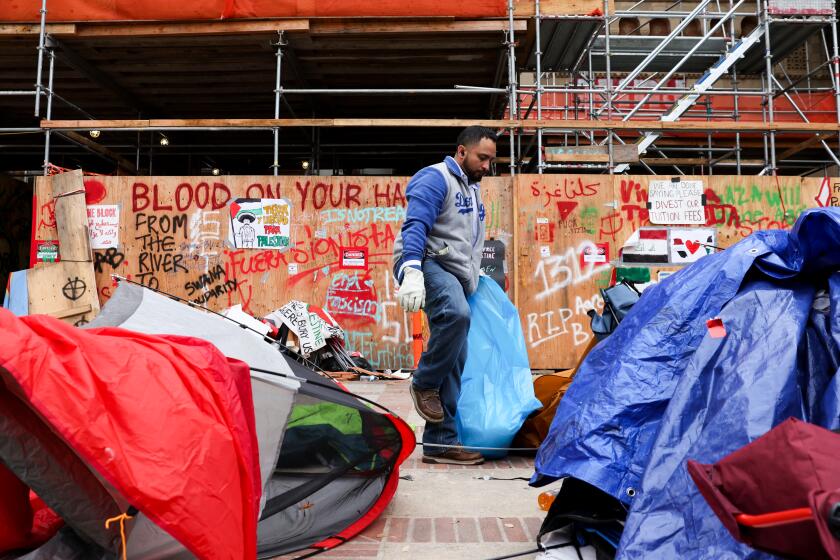Mayoral Hopefuls Focus on Housing
It doesn’t fire up voters like a stump speech on crime, schools or traffic congestion. But the sheer magnitude of the city’s housing shortage has placed it squarely--albeit quietly--on the agendas of both candidates running for mayor of Los Angeles.
Eight years of a widely criticized lack of mayoral attention to the housing problem combined with a high concentration of low-wage workers has earned Los Angeles a reputation as one of the most unaffordable, overcrowded metropolitan centers in the country, plagued by low home ownership rates and slum conditions.
Furthermore, Los Angeles has spent only a fraction of the public resources that other major cities have dedicated to the problem.
That’s a legacy that the next chief executive is destined to inherit. And housing advocates, tenants’ rights activists, developers and apartment owners alike are viewing the changing of the guard as a defining moment for housing policy.
Both former Assembly Speaker Antonio Villaraigosa and City Atty. James K. Hahn have taken heed, vowing to commit at least $100 million a year to housing--a radical break from recent years, in which the city has devoted no local money to the problem--and rattling off a list of other proposed remedies.
The candidates’ stated positions diverge only slightly, although there are key distinctions in their thoughts on where the money should come from.
Villaraigosa is eager to tap developers to help solve the problem; Hahn is reluctant to do so. Their respective records, too, hint at differences in their approach--Villaraigosa in his support of state housing legislation and Hahn in his enforcement efforts against the city’s slumlords.
But regardless of who wins, those involved in the housing debate are confident that the issue will now get much-needed local attention. According to many of those advocates, the mayor’s potential role as an agenda setter, consensus builders and advocate for state and federal housing funds is crucial if the city is to address the problem.
“It really is a sea change in terms of the understanding of what you have to do at the local level to deal with the problem,” said Jan Breidenbach, executive director of the Southern California Assn. of Non-Profit Housing. “It’s going to be a new day.”
Momentum on the issue has built since last spring, when the City Council-appointed Housing Crisis Task Force laid out the problems in an alarming report. A housing trust fund was created by the council last fall and seeded with a symbolic $5 million--the first city funding for housing in years. Last Monday, the City Council approved an additional $10.5 million for the fund in Mayor Richard Riordan’s final budget.
About 170 similar funds exist across the country, helping to subsidize affordable housing construction as well as home ownership and rents. The money typically is awarded as grants or low-cost financing to facilitate housing construction and affordability.
Both Villaraigosa and Hahn have acknowledged the gravity of the issue, discussing it with community and business leaders and raising it with select audiences.
At a recent Hollywood Palace forum, 50 North Hollywood residents facing eviction to make room for a new elementary school arrived by subway to challenge the candidates on the issue. By the time they left, some had signed up to work for Villaraigosa’s campaign.
“He told us that he approves of new schools, but he will consider the loss of the housing being destroyed,” said Maria Alicia Ponce, whose family is among 123 that will be forced to leave affordable units beginning next year. “We think he’s the ideal candidate for L.A.”
Although the Los Angeles Unified School District pays relocation benefits to displaced families, Villaraigosa has pledged support for an ordinance that would require developers who destroy affordable units to replace them elsewhere, possibly with help from public subsidies. Hahn, too, says he supports such a plan.
Neither candidate disputes the scope of the problem.
Fully 48% of all renters in the region pay more than half their income for rent or live in “extremely inadequate” housing, according to a recent report by USC and the Brookings Institution.
Fewer than one in five low-income families in Los Angeles benefit from a housing subsidy--the second-lowest rate among big cities nationwide. The city has the third-highest rate of overcrowding nationwide, and one of the lowest home ownership rates: 39%, far below the national average of 67%, recent statistics show.
Federal funds for housing have dropped steadily in recent years. Compounding the problem, the city has spent less of its available federal block grant money on housing. And until last year’s $5 million, the city had spent none of its own money for years. New York City, meanwhile, dedicated $265 million to the problem in the last year alone, said Occidental College public policy professor Peter Dreier.
Both Hahn and Villaraigosa say subsidies must be boosted to encourage affordable housing construction. Other incentives--such as streamlined permitting and liberalized zoning--should be crafted to spur construction of market-rate housing, the candidates agree. Both call for more resources to combat slumlords and pledge to create a slumlord registry to better track ownership of buildings such as one that recently collapsed in Echo Park.
Both have promoted higher housing density along transportation corridors and downtown, and both say they would appoint a mayor’s housing coordinator, similar to a position created in the waning years of Tom Bradley’s administration.
If the candidates are similar in their stated beliefs, they also reveal significant differences in how they would address the problem. Those mostly come down to who will bear the burden of fixing it.
In the case of the housing trust fund, many similar funds rely on “linkage fees” charged to developers of commercial and industrial properties, with the argument that job-creating developments should help pay to create housing for the workers they lure. Inclusionary zoning ordinances are also common. Those require developers of market-rate housing to include some low-income units or pay “in lieu of” fees into the fund.
Villaraigosa supports both, although he has argued that general fund sources should be tapped too, including hotel tax revenue and a portion of future growth in property tax revenue.
“I support a linkage fee, everybody,” Villaraigosa told a group of community development leaders at a recent breakfast organized by the Vermont Slauson Economic Development Corp. “I say that not because I’m anti-business, but because I say to the business community, ‘I want you to be a stakeholder.’ Everybody’s got to be a participant in affordable housing.”
Hahn has said he is leaning away from an inclusionary zoning ordinance, instead supporting incentives such as density bonuses that would encourage developers to build such housing on their own. Furthermore, he says he would consider a developer’s linkage fee only as “a last resort,” if $100 million a year can’t be raised through other sources.
“Sometimes I think the city government fails to do something and then shifts the onus of that failure onto somebody else,” he said. “I think that we at City Hall haven’t had the commitment to . . . build affordable housing, and our failure leads us to try to shift that burden onto private developers.”
Hahn’s deference to the development community has put some organizations at ease. The Apartment Assn. of Greater Los Angeles, for example, endorsed Hahn this week after he assured them that property owners would have a say in the debate. The group intends to pay for three pro-Hahn mailers and 50 radio spots.
Although Villaraigosa told members of the politically powerful Central City Assn. that he “wanted to talk through ways to make [a linkage fee] more palatable,” Hahn’s position on such fees “was more in line with what our membership [believes] is the appropriate policy,” said Carol Schatz, president of the business group, which has endorsed Hahn.
Still, the group and others insist that they are eager to work with either candidate and believe they will be heard no matter who wins.
“Jim Hahn . . . doesn’t come out and say he’s definitely for things we don’t like,” said Ray Pearl, executive director of the Greater Los Angeles-Ventura chapter of the Building Industry Assn. of Southern California.
But Villaraigosa “has a lot of experience with housing. He worked with a wide range of people in Sacramento, including home builders, nonprofit advocates, teachers unions and environmentalists. The experience we’ve had with [him] as a consensus builder is real.”
Among affordable housing advocates, the story is different. Many firmly support Villaraigosa, saying he was first to take a stand on the trust fund and spoke most aggressively on the issue early on.
Although the city’s nonprofit organizations are barred by law from making political endorsements, housing advocates have privately arranged two fund-raisers for Villaraigosa and pepper his list of personal contributors. Some who aren’t muzzled by nonprofit status are blunt in their endorsement.
“I can say without a doubt that Antonio Villaraigosa would present tenants with the greatest hope,” said Larry Gross, executive director of the Coalition for Economic Survival, a grass-roots tenant rights organization. “Jimmy Hahn as city attorney has in some ways presented an obstacle to efficiently and quickly enacting programs that would protect tenants’ rights and preserve affordable housing.”
Hahn said he believes his office has enforced rent control laws appropriately. Since he became city attorney, he said, the office’s Slum Housing Task Force has brought more than 23,600 housing units up to code, collected more than $6 million in fines, investigative costs and charitable donations, and won jail sentences or house arrest for 149 slumlords.
But critics say those numbers are low, given the condition of the city’s housing. A record in the Legislature, meanwhile, has enabled Villaraigosa to trumpet some broader efforts. He repeatedly says he fought for a historic $500 million in new housing funds in last year’s budget. Housing advocates agree that he was supportive, but some point out that he was not among the core players and was no longer speaker when the deal was finalized.
Still, advocates say, Villaraigosa took a lead role while in Sacramento in protecting housing benefits for public assistance recipients.
More to Read
Start your day right
Sign up for Essential California for news, features and recommendations from the L.A. Times and beyond in your inbox six days a week.
You may occasionally receive promotional content from the Los Angeles Times.







